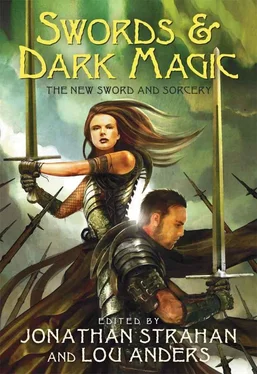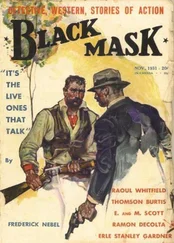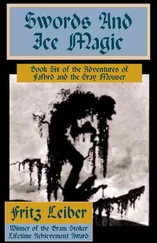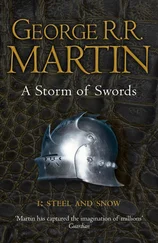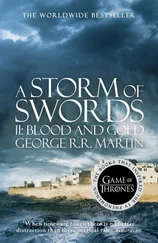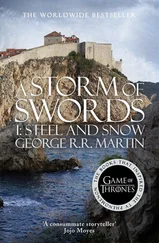He was back at the usual time the next day, but the Broken Fist was closed. Closed permanently: the door and window-shutters of the inn were nailed shut. He asked a passing townswoman, who told him that Leen had packed up in the night.
“People say he’s moved north to Sarkunden,” she said. “I’m going south, myself. People say Viklorn’s already been there: why would he go back?”
Morlock brushed aside people and their concerns and stuck to the essential point. “Leen went to Sarkunden—a thousand miles away?” he shouted. “Is he insane? What am I supposed to drink?”
The townswoman made a suggestion. Morlock declined (the fluid she mentioned was not an intoxicant), and went back to his cave.
For a day or so, Morlock suffered the delirium that comes sometimes at the end of a drunken binge. Finally he fell asleep and dreamt a prophetic dream. (Among his other wasted talents, Morlock was a seer.)
In the dream, Morlock saw himself confronting Viklorn and Andhrakar. Viklorn was a tall pirate with eyes as red as a weasel’s. He wore dirty, pale, untanned leather with golden fittings, and a gold clip kept his shaggy blond hair out of his face. He said nothing; they fought silently, except for the sound of Andhrakar’s deadly unbreakable blade clashing against Morlock’s sword. Andhrakar dripped with fresh blood, but it was still hungry for life, and soon it began to sing, faintly at first, but then louder and louder. Viklorn laughed, excited and pleased, and Morlock awoke with a curse in his mouth.
This was bad, he thought, sitting up. Never in a thousand years would he have chosen to fight someone armed with Andhrakar. But, although he might be not especially brave (a phrase Morlock preferred, when sober, to the franker coward ), he wasn’t stupid. He would fight Viklorn: so the vision told him. He needed to act swiftly if the meeting was to be on his own terms.
He consulted a crow he knew in the neighborhood, who promised to locate Viklorn for him. He spent that day and the next doing exercises to bring his agility and wind closer to what they once had been. When the crow came and told him that Viklorn was at Dhalion, a day’s walk north and west, he thanked it and fed it some grain. Then he threw his backpack on his shoulders, belted on his sword, and started loping with a long, uneven stride northeast on the old Imperial Road. The chances were he would run into Viklorn, if Viklorn was moving eastward from the Narrow Sea.
The road was bad. The old Empire of Ontil had been out of business for centuries, and its roads were returning to nature. Often Morlock walked next to the “pavement” of shattered rocks, dense with tree-roots and overgrowth. But he made pretty good time going on foot. He had a serenely unpleasant feeling he was headed straight for his destined meeting with Viklorn, and it turned out he was right.
It happened this way. Morlock topped a ridge and, looking downward, he saw a wagon overturned beside the road. This was not uncommon. The road was the only route through the masterless lands, but it was terrible for carting goods. Morlock found with surprise, though, that he recognized the man standing beside the cart: it was Leen. He’d had at least three days’ head start on Morlock, but his property must have slowed him down. Morlock saw some people running away from the cart, farther up the road. Perhaps they were going for help, although there was little help to find along this road. Then Morlock saw a man approaching Leen. Morlock knew this man also, but not from seeing him in his waking life. It was the hulking blond man in his dream, the man who carried Andhrakar: Viklorn the killer.
“Leen!” shouted Morlock, lifting his leaden feet and running down the hill. “Run away, you fool! Leave your stuff! I’ll make you a new still! I’ll make you new gold! Run like hell!”
But Leen didn’t run. He turned to face Viklorn the killer, with a piece of wood in his hand and no hope in his face. Against Viklorn, he was like a squat mountain peak, impinging on the great golden face of a rising moon. He didn’t seem to hear Morlock, and as Morlock ran closer he heard what Leen must have heard before: the sweet musical tone of the singing spear, growing deeper and stronger as the foredestined moment of death approached.
Leen had stayed behind intentionally, Morlock realized—stayed to confront Viklorn, knowing he would die, giving the others a chance to run for their lives. Leen struck out at Viklorn with his makeshift club. The killer easily evaded his blow; Andhrakar slashed twice and Leen fell in three pieces on the ground. Viklorn laughed a high-pitched, weary, hysterical laugh. So Leen died—a shrewd man and brave, though that didn’t save him.
“You son of a bitch!” Morlock shouted, tears stinging his eyes. “You’ve killed my bartender!”
Viklorn turned to face him. His eyes were red as a weasel’s—as red as the fresh blood dripping from the spear. He pointed at Morlock with the dark blade—crystalline, unbreakable, fashioned by the greatest magical craftsman the world had ever known—and smiled.
Morlock shrugged his backpack off onto the broken road behind him and drew his sword. Viklorn’s smile dimmed as he saw the blade, kin to the spearhead on his own weapon: dark, crystalline, unbreakable. Morlock demonstrated the latter fact by passing the sword through a broken pillar beside the road. It fell obligingly to pieces, raising a great cloud of dust. Morlock leapt through the cloud, lunging at Viklorn.
If the fight had been between Morlock and Viklorn, Morlock would have won easily. True, Morlock was a drunk rather badly in need of a drink, not at all the man he had been. But Viklorn was not well either: his face was the face of a dying man; God Sustainer knew when he had last slept, or if he ever ate or drank.
But the fight was really between Andhrakar and Morlock. Viklorn looked on in bemusement as his dark blade feinted and lunged at the man who had made it. Andhrakar didn’t need sleep, or food, or water, or air. All it needed was human life; all it hungered for was the savor of dying men and women. Though it still dripped with fresh blood, it was clearly thirsty for more; it began to sing, faintly at first, but then louder and louder. Viklorn laughed, excited and pleased, and Morlock cursed. The singing tone rose and fell and rose again, like a bell, like the baying of a dog. Andhrakar would kill again, and soon.
The spear lashed out. Morlock ducked away from the spearhead and grabbed the shaft just above Viklorn’s lifeless hand. Morlock brought down his dark blade and slashed off Viklorn’s spear-hand at the wrist. The severed hand still clutched the shaft of the spear in an unbreakable grip. The spear still sang, louder than ever now, drowning all other noises. Morlock spun the business end of the spear about. As Viklorn stood there, blinking at the gushing stump of his arm, Morlock buried the dark shining spearhead in his neck. Viklorn fell backward to the ground and the singing spear fell silent, slaked by his death.
Morlock! The voice of the demon Andhrakar sounded in his head. Will you free me now from this prison you made for me?
Morlock laughed harshly as he cleaned and sheathed his dark blade. “Hope springs eternal in the demonic breast. Learn despair, Andhrakar: I won’t free you to hunt human souls. I can’t understand how you caught this one. I bound you in the spearhead, then buried you in a crypt full of traps, and then posted a warning outside the crypt. How did you get free?”
Warning—or advertising? the demon whispered in his mind. Generations of heroes died seeking the lost treasure left by Morlock the Maker. Finally one succeeded. His people would be making songs about him now—if I hadn’t persuaded him to kill them all.
Читать дальше
